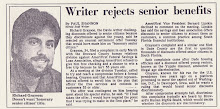
The Friday, May 6, 1983 issue of
ISRAEL TODAY features an article on page 13called "The Writings of Richard Grayson" by
Mark Bernheim:
The Writings of Richard Grayson
MARK BERNHEIM Which is the harder job – writing literature or writing about it? For those of us committed to writing about writers, we face the challenge to determine who has something to say and who has nothing, when the voice of the genuine writer is to be heard above the copyist or the mimic. At what point does a "promising talent" metamorphose into an established literary presence? For the greats even, when did they enter that state; when were they no longer "new voices" looking for an ear?
Of the many ambitious new writers whose works I receive, I could point to one Florida-based author, Richard Grayson, who seems genuinely posed for flight with a recognizable voice and content his own. A couple of years ago Grayson brought out a collection of sketches whimsically called Lincoln's Doctor's Dog, since he had read that the best selling books of recent times dealt with three subjects – presidents, animals, and diseases – and as a combination, well, a sure thing. Over the past few years he has brought out an impressive number of stories written in a widely experimental range of forms in small magazines. They are important efforts by virtue of their innovative voices and treatments of anxiety. Grayson is able to create a full range of masks from behind which the artist peers out to make his criticisms of artificial modern life. Among young writers born in the mid-point of our century, he holds an important place.
Many readers where drawn into his penultimate publication, commissioned by the Florida Arts Council, the flamingo-colored
Eating at Arby's, which I thoroughly enjoyed last year. Grayson sounds a genuinely original voice in this slim volume that punctures the pretensions of never-never land life in what passes as America's idyll. The book is written in a deceptively simple, primitive style which invites our judgment on vacuity as the substitute for human contact. Florida may never be the same again after his portrayal of it in its plasticity and gaud. Underneath the shiny surface, the absence of human values becomes apparent, and Grayson looks everywhere in the exploding population of immigrant – the old, the ethnic, the outcast – for signs of some spirituality:
"Let's make friends with those Haitian refugees. Let's take them with us to eat brunch at the Rascal House."
"Oh Manny," cried Zelda. "You are so silly. Haitian refugees do not come here to eat brunch at the Rascal House. They come here for freedom. You cannot get freedom at brunch at the Rascal House."
"Zelda, you are right. I made a silly mistake . . . someday I hope those Haitian refugees will have brunch at the Rascal House. We should give them free Danish and onion rolls so they know they will be welcome here in South Florida."
"Oh, Manny, you are being silly again. Even in South Florida there is no such thing as a free brunch."
Perhaps the echoes here of Albee and Ionesco will be a bit strong for critics who might term Grayson derivative, but for those who are familiar with the peculiar anxieties of contemporary life – and especially Jewish life, for Grayson comes directly from an observant tradition – his aim is right on focus.
His newest work,
I Brake for Delmore Schwartz, is particularly impressive as a collection of pieces written and rewritten over a period dating back to the mid-seventies. To my mind, Grayson is best when he distances himself what only appears to be personal involvement but probably isn't. Nonetheless, when he is clearly creating fictional portraits of other disturbed people of all backgrounds, he is very sharp, and some of his characters will burn themselves into your memory. Did I say characters? One of the best in the new collection puts the narrative on the cold – yes, cold – that killed William Henry Harrison after the shortest term on record as U.S President back in 1841. In some respects, the story is typical of Richard Grayson – the unexpected insight into a cliché, a commonplace of the mind that we have never seriously thought about before. His best voices --- whether a two-page sketch of this pompous cold that saved a nation from an incompetent or a full-length picture of the gloomy artist who would brake – and probably break, too – for a broken figure like the poet Delmore Schwartz – these voices matter.
Grayson has written, "It's the pedestrian realities that are unchanged in my fiction, while the emotions go through great metamorphoses." It is these emotions that make the challenge of writing about writers a promise, never a discouragement.



















